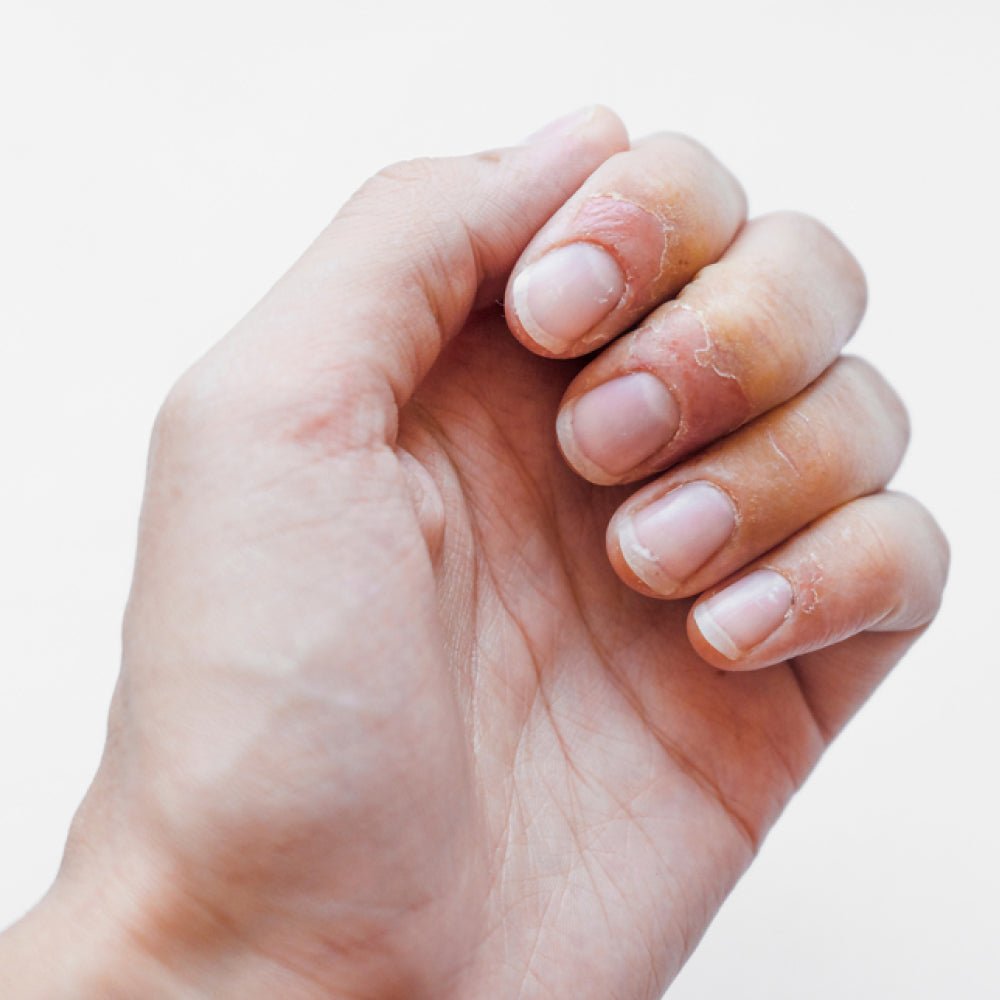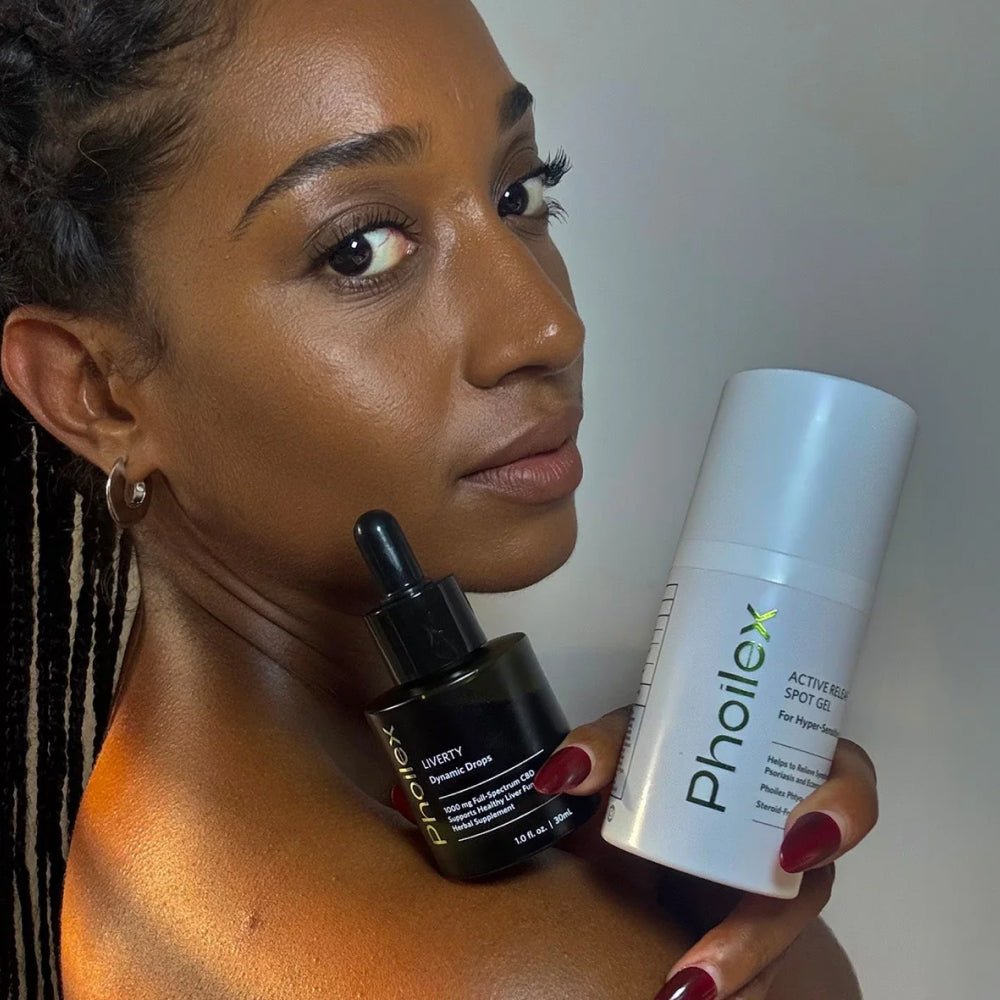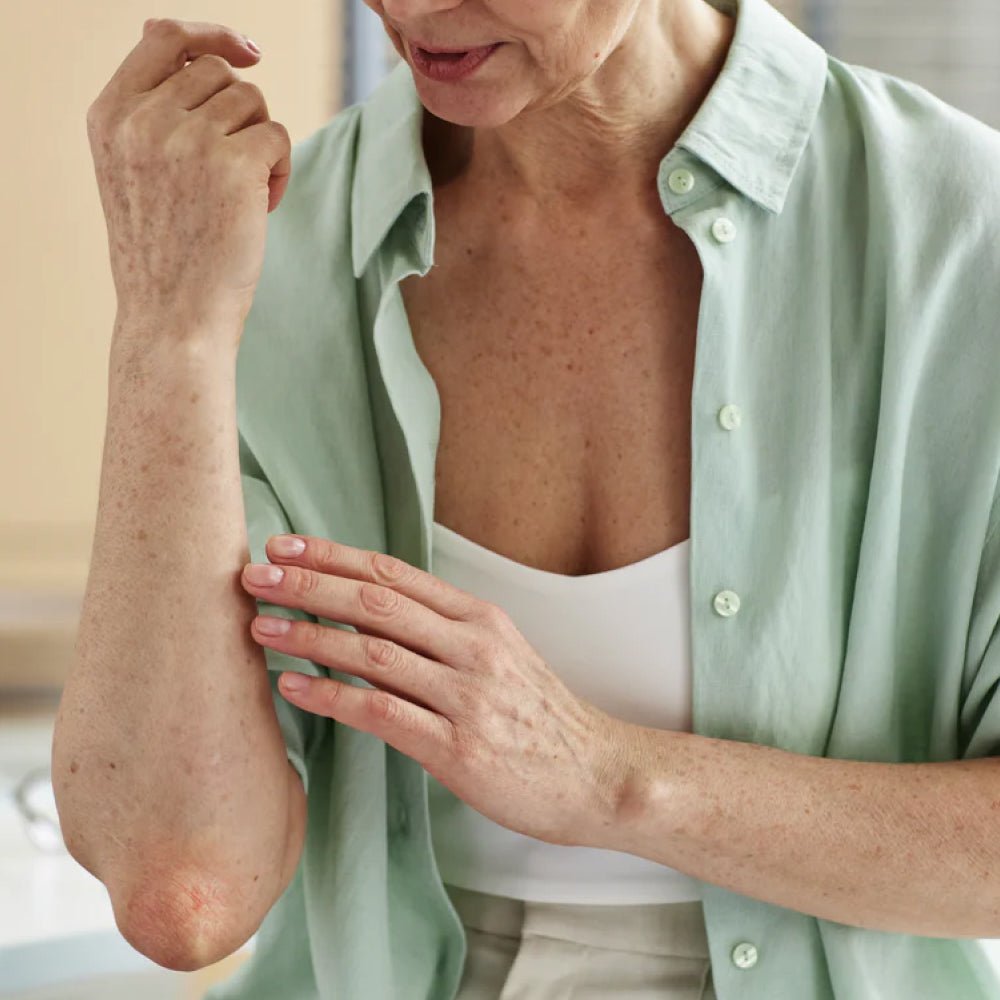Although eczema is often considered a childhood skin condition, it affects over 31.6 million Americans (National Eczema Association, 2017, What is eczema?). This highlights its prevalence across all age groups, including seniors. To improve skin health in the older population, it is essential to comprehend the causes of eczema in seniors and its effective treatments.
Why Do Seniors Develop Eczema?
As you age, your skin becomes thinner and drier, increasing your susceptibility to itching and irritation. Over time, the barrier that protects your skin from infections and allergens tends to deteriorate, making you more susceptible to chemicals and fragrances (WebMD, 2023, Eczema in older adults: What you should know). In women, hormonal changes during menopause can weaken the skin barrier, increasing the risk of eczema.
Eczema affects 10.1% of Americans, and many people develop symptoms later in age (Illinois Dermatology Institute, 2024, Eczema care for seniors: Managing skin health in later years).
Common Types of Eczema in Seniors
Older adults face various forms of eczema. Each requires tailored approaches to treatment.
Atopic Dermatitis
Atopic dermatitis in seniors often presents as red, dry patches accompanied by intense itching. This variety of eczema typically manifests on hands, elbows, and knees (WebMD, 2023, Eczema in older adults: What you should know; Illinois Dermatology Institute, 2024, Eczema care for seniors: Managing skin health in later years).
Varicose Eczema
Varicose eczema in seniors develops in females with limited movement tendencies, elevated blood pressure levels, varicose vein condition, or blood clot issue history. In seniors, the skin on the lower legs becomes brittle and fragile, increasing the risk of breakdown and ulceration. Widespread eczema develops into severe states that weep fluids while forming crusts on the skin surface (National Eczema Society, 2023, Eczema in later life; WebMD, 2023, Eczema in older adults: What you should know).
Asteatotic Eczema
Asteatotic eczema signs include rough skin with a cracked and scaly appearance which typically appears on shins but may spread to thighs, arms, and trunk. Asteatotic eczema affects people who live in warm dry areas throughout winter seasons when skin dehydration becomes more common (WebMD, 2023, Eczema in older adults: What you should know; National Eczema Society, 2023, Eczema in later life).
Symptoms of Eczema in Seniors
In seniors, eczema symptoms may present with increased severity. They may result in prolonged healing times. Recognizing these symptoms is essential for effective management.
-
Dry Skin
Seniors experience reduced sebum production, weakening the skin barrier and reducing moisture retention. Aging skin develops xerosis commonly known as dry skin and researchers estimate this affects between 50% of adults who reach this age group (Paul, C., et al., 2011, Prevalence and risk factors for xerosis in the elderly: A cross-sectional epidemiological study in primary care).
-
Increased Itch
If itching worsens, consult a dermatologist or primary care provider. They will help determine root causes and select effective treatment solutions.
-
Wrinkles and Cracks
The natural aging tissue of the human body develops wrinkles with fine lines; however, the problems become worse when eczema exists. This condition may cause the skin to crack, leading to open wounds that are more susceptible to infection.
-
Discoloration
Eczema in seniors can result in patches of discoloration on mature skin, appearing in various shades such as pink, red, gray, purple, or brown, depending on an individual's skin tone. In those with lighter skin, aging can make the skin appear more translucent, highlighting eczema-related inflammation.
-
Infection and Slow Healing
Mature skin is generally more vulnerable to secondary infections due to its reduced capacity for repair and regeneration. Scratches and open skin from eczema can allow bacteria to enter, leading to infections and delayed healing.
Eczema Treatments for Seniors
To effectively address eczema in seniors, exploring various treatment options that cater to their specific needs is important. Here are some approaches that can help.
1. Avoid Triggers
Avoid common triggers, including pollen and harsh soaps containing sulfates, or soaps containing fragrances/essential oils. Additionally, maintain a calm and relaxed environment as stress can exacerbate symptoms (Senior Stride Home Care, 2024, Eczema care for seniors: Managing skin health in later years).
2. Use a Calming Moisturizer
A calming moisturizer is essential during eczema flare-ups. Regular application of fragrance-free moisturizers can help maintain skin hydration and support the skin barrier (National Eczema Society, 2023, Eczema in later life).
3. Consider Immunosuppressant Treatments
Use immunosuppressive medications with infection cautions to moderate the immune response. A safer alternative is non-steroidal treatment, such as Phoilex products, which effectively reduce inflammation without side effects. Featuring the exclusive Phyto-Active Blend™ formula, Phoilex offers a powerful, and fragrance free solution designed to address various skin issues, including eczema—making it perfect for managing eczema in seniors.
-
Active ReLeaf Spot Gel provides quick relief with its Phyto-Active Blend™, soothing itchy skin and reducing redness while strengthening the skin barrier.
-
Liverty Dynamic Drops address internal inflammation in the nervous system, a key eczema trigger. They support skin health with herbs and vitamins. Our blend offers essential protection against oxidative damage in the liver and skin.
-
Dynamic ReLeaf Duo eases itching and inflammation for up to 12 hours, offering soothing moisturization and stress relief.
4. Handle Your Skin with Care
Avoid hot water, scented soaps, and harsh detergents. Keep the skin clean and well-moisturized, and consider using a humidifier to prevent excessive dryness (National Eczema Society, 2023, Eczema in later life).
Soothe, Heal, and Protect with Phoilex
Effective management of eczema in seniors requires a thoughtful approach to skincare. Understanding the causes and symptoms can help you customize therapy to meet the particular requirements of senior citizens. Using steroid-free skin treatments allows senior eczema patients to achieve both safe health improvements and enhanced comfort. With clinically proven results and a commitment to natural ingredients, Phoilex supports you in taking control of your skin health. Check out Phoilex products today to start the soothing relief and skin protection.
FAQs:
Q: What are the main causes of eczema in seniors?
A: Seniors develop eczema primarily due to age-related changes in skin thickness and barrier function. The skin becomes thinner and drier with age, while the protective barrier weakens, making seniors more susceptible to irritants, chemicals, and fragrances. In women, hormonal changes during menopause can further compromise the skin barrier.
Q: How does varicose eczema differ from other types of eczema in older adults?
A: Varicose eczema specifically affects the lower legs and is common in seniors with limited mobility, high blood pressure, or a history of varicose veins. This type of eczema can cause the skin to become brittle and fragile, leading to fluid weeping and crust formation, with an increased risk of ulceration.
Q: What are the typical symptoms of atopic dermatitis in seniors?
A: Atopic dermatitis in seniors typically presents as red, dry patches with intense itching, primarily affecting the hands, elbows, and knees. These symptoms can be more severe in older adults due to their compromised skin barrier function and reduced natural moisture retention.
Q: How can seniors identify asteatotic eczema?
A: Asteatotic eczema is characterized by rough, cracked, and scaly skin that commonly appears on the shins but may extend to the thighs. This condition is particularly common in older adults and often worsens during winter months when skin tends to be drier.
Q: What percentage of Americans are affected by eczema?
A: According to recent statistics, eczema affects approximately 10.1% of Americans, with over 31.6 million people experiencing some form of the condition. Many individuals develop symptoms later in life, making it a significant concern for the senior population.
Q: What factors increase the risk of eczema in older adults?
A: Risk factors for eczema in seniors include decreased skin moisture, weakened skin barrier function, and hormonal changes, particularly in post-menopausal women. Environmental factors such as dry air, harsh soaps, and certain medications can also increase the likelihood of developing eczema in older age.
References:
-
Collins, S. (2023, August 1). Eczema in older adults: What you should know. WebMD. https://www.webmd.com/skin-problems-and-treatments/eczema/ss/slideshow-eczema-in-older-adults
-
Illinois Dermatology Institute. (2024, April 23). Eczema care for seniors: Managing skin health in later years. Illinois Dermatology Institute. https://illinoisderm.com/blog/eczema-care-for-seniors-managing-skin-health-in-later-years/
-
National Eczema Association. (2017). What is eczema? National Eczema Association. https://nationaleczema.org/eczema/
-
National Eczema Society. (2020, February 10). Eczema in later life. National Eczema Society. https://eczema.org/information-and-advice/types-of-eczema/eczema-in-later-life/
-
Paul, C., Maumus-Robert, S., Mazereeuw-Hautier, J., Guyen, C. N., Saudez, X., & Schmitt, A. M. (2011). Prevalence and risk factors for xerosis in the elderly: A cross-sectional epidemiological study in primary care. National Library of Medicine. https://pubmed.ncbi.nlm.nih.gov/22104182/
Read more

Pediatric dermatology recognizes nail eczema vs psoriasis as distinct conditions that severely impact nail function. Previous eczema anywhere on the body increases the risk of developing nail eczem...

When it comes to building confidence in eczema products, it can be a hit or miss.Having eczema since I was a young girl, I know firsthand the challenges of finding products that actually work—espec...
